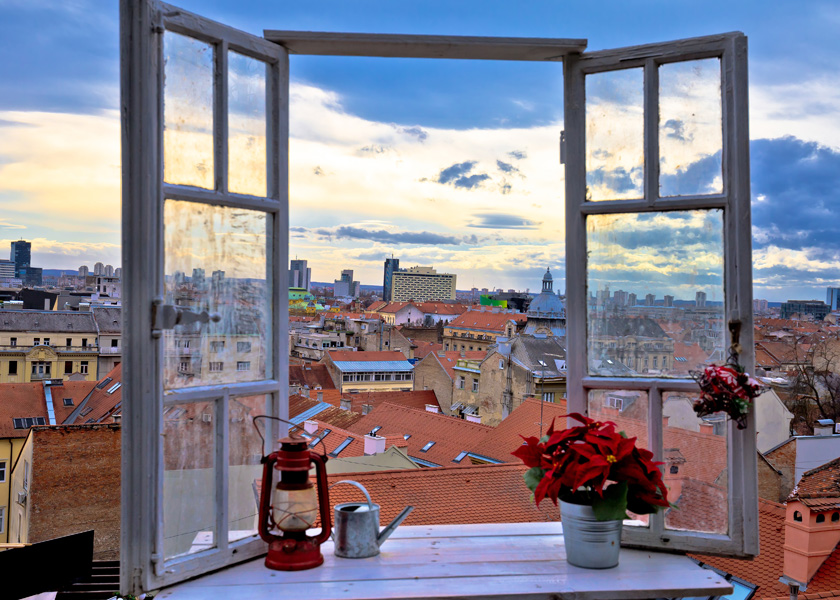High level conference for investigative journalists “Media in the Fight against Corruption”
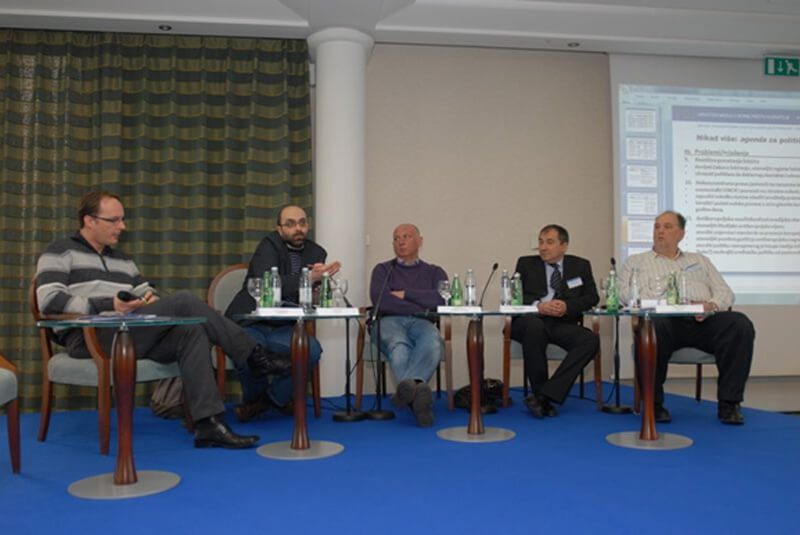
March, 2011 Zagreb, Croatia

The conference ‘Croatian Media in the Fight Against Corruption’ gathering journalists, publishers and media owners opened at the Westin Zagreb Hotel on Tuesday, 1 March 2011. The conference is co-hosted by the Croatian Ministry of Justice and the Delegation of the European Union to Croatia. The conference is a part of the ‘Strengthening Anti-Corruption Inter-Agency Cooperation – Awareness Raising Campaign’ project financed through the EU IPA 2007 program for Croatia.
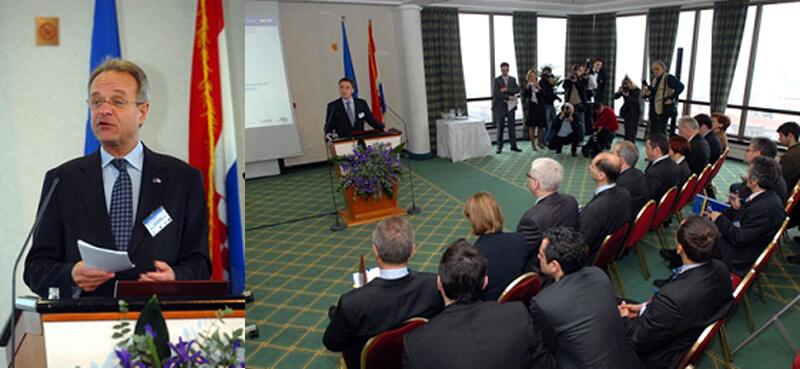
The conference was opened by the Head of Anti-Corruption Sector in the Ministry of Justice Davor Dubravica who stressedthe goals of the conference: to recognize, transfer and exchange best anti-corruption experience in the media, to provide suggestions to raise awareness and sensitivity in the public of everyday forms of corruption, to get feedback on the knowledge of the Government’s Anti-Corruption Strategy, to give suggestions for better media coverage of the anti-corruption campaign in Croatia, to consider the theoretical, historical and legal aspects of struggle against corruption, to analyze investigative journalism as the best media tool for struggle against corruption, to analyze and learn from anti-corruption cases from the region, to analyze and learn from anti-corruption cases in Croatia so far, and to educate journalists about the struggle against corruption.
Welcome addresses were given by Secretary in the Ministry of Justice and Project Leader Tihomir Kralj, State Secretary Tatjana Vučetić, and the Head of the EU Delegation to Croatia, Ambassador Paul Vandoren. He pointed out that the EU has financed anti-corruption related activities in Croatia since 2002 with a total sum of EUR 33 million. Around EUR 20 million has been spent by now, while nearly EUR 900,000 will be spent in this Awareness Raising Campaign led by Key experts Constantin Palicarsky and Ksenija Renko.
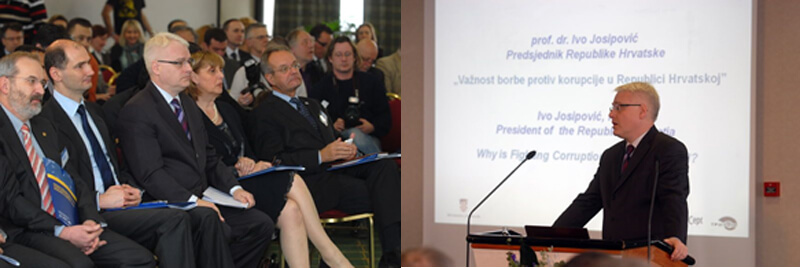
The opening address was given by CroatianPresident Ivo Josipović, who described the last two years as an important turning point which shows that things in Croatia will never be the same again, in the sense that nobody involved in corrupt conduct can feel protected any more. The president said that he was often being asked whether Croatian society has become more just. The difficult economic situation, the president stressed, does not testify to that, but it does point at changes in the attitude towards corruption, given that some of the highest-level officials are under investigation. The president also emphasized a higher level of optimism among the citizens, as evidenced by recent opinion polls. He claimed that this shift in public opinion came into being as a result of an increase in the number of corruption-related lawsuits, which was confirmed by the State Prosecutor’s Office. The president mentioned the code-names of all big legal cases in which high-level state official were arrested and pointed out that, unfortunately, corruption is present in the media, too. There are corrupt individuals, situations where the media are blackmailed by advertisers, and the issue of censorship. Mr Josipović also stressed the fact that the media should by and large be credited for uncovering corruption affairs.
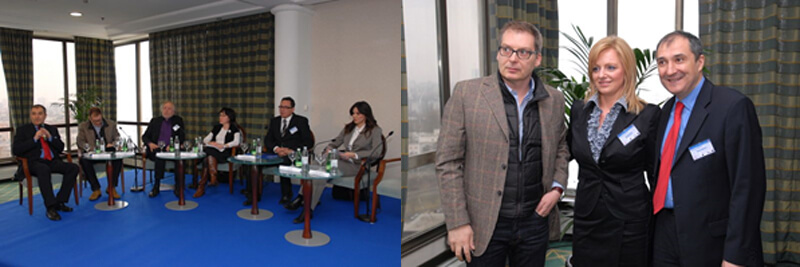
The media conference involved round tables, presentations by notable Croatian and international experts and Croatian journalists with experience in covering anti-corruption efforts, as well as discussions of all participants. A panel discussion called ‘Balance of Croatian Media in the Fight Against Corruption’ was held with participation of Nova TV News Section director Iva Gačić, HTV acting director-general Josip Popovac, T-Portal editor-in-chief Alemka Lisinski, Croatian Journalists’ Association President Zdenko Duka and Jutarnji list deputy editor-in-chief Igor Alborghetti. The panel was moderated by freelance journalist Dražen Rajković. The participants discussed the following topics: whether 1 July 2009, the day when former PM Ivo Sanader submitted his resignation, represented a turning point for a more open and more energetic media coverage of corruption affairs; why Croatian media were not critical enough in writing about Sanader and his governance model while he was still in power; how they assessed the implementation of PM Jadranka Kosor government’s anti-corruption policies; if Croatian media contributed sufficiently in the fight against corruption; and what the media and their publishers should do to improve this struggle in the immediate future.
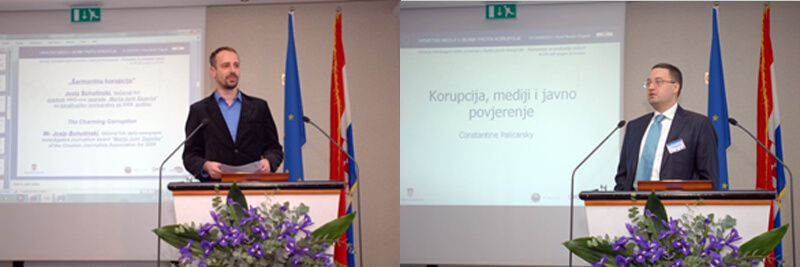
The third part of the first day saw the following presentations: ‘Charming corruption’ by Večernji list journalist Josip Bohutinski, who had won the 2009 HND award for investigative journalism and who presented the case of corruption in HAC (Croatian Motorways); ‘Corruption, media and public trust’ by international expert Constantine Palicarsky; and ‘Organized crime and corruption – the local impact of a global issue’ by honorary lecturer at California’s Stamford University and a member of the Board of the International Centre for Journalists Paul Radu.
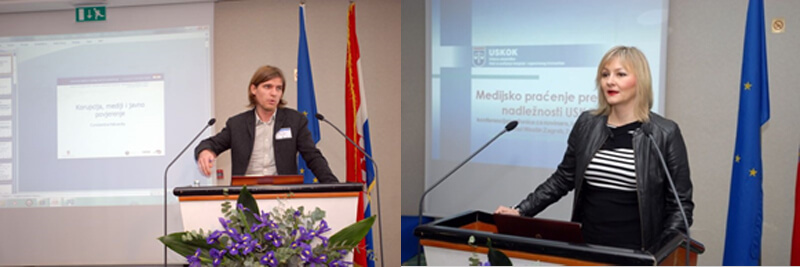
Deputy Head of USKOK Nataša Đurović held a first speech on the second day of the Conference, entitled ‘Media coverage of cases under USKOK’s competence’. She fully confirmed the individual’s right to freedom of expression, the freedom of media and the public’s right to information access. However, she also stressed that legislation in all well-organized countries, including Croatia, allows public authorities to limit the public’s rights to information access in certain exceptional cases, e.g. during the course of judicial proceedings and judicial investigations. For breaches of confidentiality of proceedings, pursuant to the Criminal Code, a fine or sentence to imprisonment is envisaged in Croatia. Nataša Đurović stressed in particular the importance of media keeping confidential the identity of protected or endangered witnesses. She also commented the recent instances of media publishing statements made by certain important witnesses related to corruption cases, which, as she stated, did not leak from USKOK, and which she characterized as largely, yet not entirely authentic, which she attributed to the attempts to influence the course and outcome of judicial proceedings.
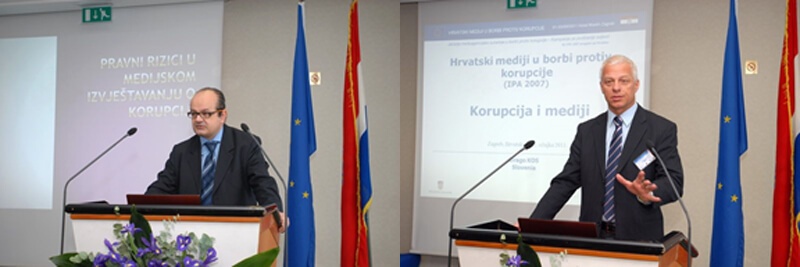
Lawyer and media law expert Emil Havkić addressed in his presentation the legal risks involved in media coverage of corruption. He described in detail the chronology of attempts by the Croatian authorities over the past two decades to legally limit space for independent press to reveal corruption affairs. He pointed out that the public authorities in Croatia have a constant tendency of broadening for journalists and citizens the area of confidentiality. After a certain ‘relaxed’ period, aspirations to limit the freedom of public speech have grown stronger recently. The proposal in the most recent amendments to the Criminal Code foresees the sentence to imprisonment for up to one year as a sanction for defamation. In addition, a so-called institute of shame is introduced. All of this could have restrictive influence on media reporting on corruption cases.
Former Chairman of the Slovenian Corruption Prevention Commission and Chairman of the Group of States against Corruption (GRECO)Drago Kos spoke about the relationship between corruption and the media. In his opinion, the media have significant influence on the prevention of corruption, both directly and indirectly. The main obstacles to freedom of press include media ownership, dependency on financial impacts of advertising, fear of negative reactions, reliance on official sources of information and limited access to information. Credibility of the media is diminished when securing the existence and position in society is preferred over informing the public in an objective, impartial and responsible manner. Media and the press bear particular responsibility for the preservation and enhancement of free press, for thorough information checking, adherence to principles of legitimacy, democracy and integrity and for the preservation and building of awareness about threats caused by corruption.
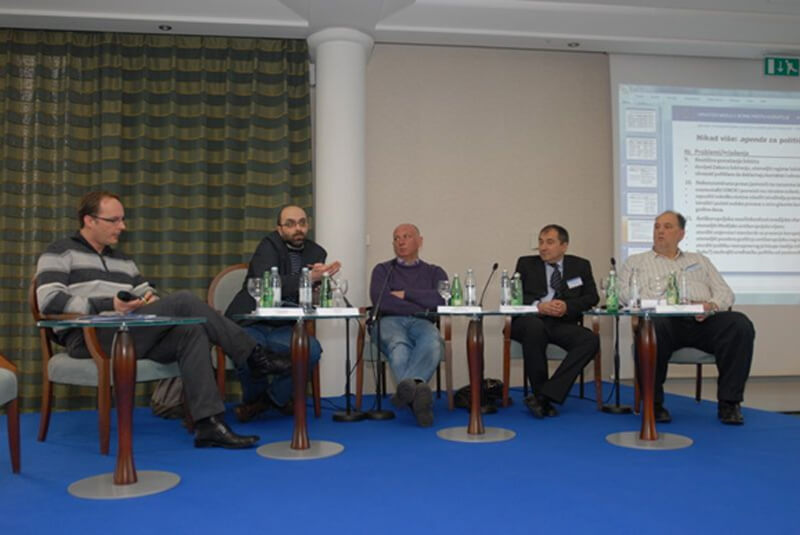
Program of the Conference also included two panel discussions on investigative journalism case studies. The discussion on the first journalist panel was opened by Jutarnji list journalistGordan Malić with his presentation ‘Politics, media and corruption – Is integrity enough’. Malić pointed out that opening anticorruption processes is accredited to the change in the political leadership because no other changes took place. The fight against corruption resulted in the criminalization of HDZ, but not of the oligarchy that benefited from arrangements with Ivo Sanader and is now seeking its place in the future. HAC managers are in prison, but not the owners of contracted companies and their subcontractors who were used to embezzle billions of kuna from the budget. In Gordan Malić’s opinion, the opposition is mistaken in claiming that the reasons for the fight against corruption will cease to exist once they are in power. It is not enough to have integrity; the best evidence of this is the mandate of Ivica Račan’s government when political processes were run by the street and mafia. As concluded by Malić, there is a repeated threat of such chaos; therefore, it is necessary to help HDZ to go all the way with the reforms.
Denis Latin, editor of ‘Latinica’, a recently terminated HTV programme with high ratings, provided in his presentation ‘The role of public television in the fight against corruption’ an review of this public service. Latin believes that the existing organizational structure of HTV, with the Supervisory Board and Program Council on top, the management and the editors in the middle and the journalists at the bottom, should enable a non-selective fight against any corruption. Unfortunately, the practice over the past seven years since Ivo Sanader came to power was much different. In that period, not only that Croatian public television did not become the best possible ground for the fight against corruption, but all such editorial and journalist attempts were prevented and suppressed and the very public television became a place of breeding of corruption of all kinds. From the start, Sanader treated public television merely as grounds for corrupting the corrupt. At HTV, millions were awarded in clientelist way and without public tendering for extremely expensive soap operas, millions were furnished to those suitable for documentary series and certain individuals were allowed to order foreign programs at prices several times above prescribed budgets. Over the past period, those most affected were journalists-investigators who started working freely only after 2000. Their programs were terminated, wages withheld, they were fired from their jobs, intentional diversions of their programs were organized and campaigns against them were started by journalists from the press media whose owners had business deals with Sanader. Today, investigative journalism is almost entirely eliminated from the public television. With a series of political moves, including the new Law on HRT, adoption of which was supported by both left and right political parties and which additionally financially weakened the public television, the primary public role of fighting corruption is intentionally neglected and forgotten. A strong public television, in Latin’s conclusion, obviously does not play well with politics that used corruption as the mode of governance.
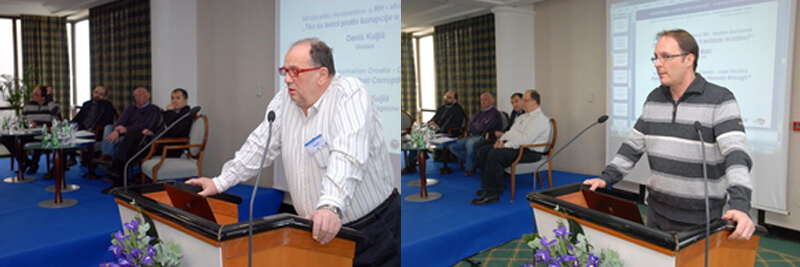
Globus magazine journalist Denis Kuljiš attempted in his presentation to answer the question: ‘Who are the fighters against corruption in Croatian media?’ His starting point was the claim that the most visible contribution to the fight against corruption is the one made by journalists. But journalists and media campaigns are managed by editors. Their engagement is crucial to the success of the anti-corruption struggle. A successful editor has to be autonomous in relation to the publisher and enjoy authority among the journalists he is working with. However, above all, it is the owner of the media platform or business, whether private or government-owned, who has to establish an investigative format. These are very complex operations that require high concentration of financial and human resources of specialized journalists, redactors, analysts, editors and lawyers, who bring supreme social power to the publisher, the power which can change the balance between political parties in the society. According to Denis Kuljiš’s analysis, there are three basic evolutionary types or forms of anticorruption reporting. The first one is the ‘corruption affair’, a singular occurrence that attracts enormous publicity at different media platforms. The second and higher-level is the ‘media campaign’, previously known as ‘media harangue’, while the third and the highest-level is the ‘media storm’, which affects all platforms, spills into public political space and changes the perception of protagonists of political and economic life with significant repercussions.
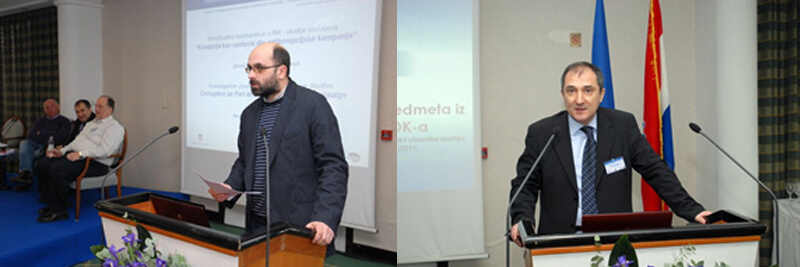
Novosti magazine editor-in-chief Ivica Đikić focused on corruption as the integral part of the anticorruption campaign. Daily and weekly newspapers in Croatia have for months been publishing confidential statements given by various suspects in different anticorruption investigations. Investigations are protected by their confidentiality, but selected statements are still published in newspapers on daily basis. Until now, newspapers have not published any confidential statements that would put in jeopardy any actions by the State Prosecutor’s Office; only those confidential information that are in favour of the prosecution have been published. Therefore, it is logical to make the conclusion that most likely; it’s either the State Prosecutor’s Office or someone who acts in the State Prosecutor’s Office best interest that is behind leaking confidential statements into newspapers. If we leave suspects’ and charged persons’ human rights aside, we come to the question why is it that newspapers agree to be a means in the hands of the prosecutor? Why do they allow a situation where every day someone is denying the main heading from yesterday’s cover page, while there is not one official source of information that would publicly verify its authenticity? It is clear what the State Prosecutor’s Office gains, but what do the newspapers gain? The newspapers think they gain on circulation, while in the long-term, as exactly proven by numbers and statistics, they lose both in terms of circulation and credibility. Credibility is lost over constant denials and journalists’ and editors’ lack of adherence to rules of their own trade; statements from one source (usually anonymous) are published daily, just like on a conveyor belt, distorted to the extent that they look more like a caricature of investigative journalism than real investigative journalism. Because of this frivolous and anti-trade approach, each next statement, no matter how serious it is, actually becomes irrelevant. And this is how credibility and then circulation are lost. Hence, editorial policy during the anticorruption campaign is largely based on the generosity of an (anonymous) source that will deliver ‘exclusive’ for the cover page, and the rest of the newspaper will somehow be filled. How to be objective towards a source that resolves journalists’ and editors’ everyday problems? Does the answer to that question lie in the fact that the newspaper that publishes confidential investigative statements for the most part is the one with no critical articles about the State Prosecutor’s Office? Are we witnessing corruption in the very centre of the anticorruption campaign?
Freelance journalist Dražen Rajković tried to make a comprehensive synthesis of Sanader’s octopus. At first, he listed the five main models for sucking money out of the public sector: flouting public procurement regulations and procedures, sucking money out of the public sector, favouritism during privatization, speculating with building land, and political corruption. During the six years of Sanader in power, all these models for sucking money out of the public sector accounted for a damage to the national budget of 88 billion kuna, which equals the total national budget in the first year of Sanader’s term, or three times the direct costs of the Homeland War. During the rest of his presentation, he set forth a detailed top 20 list of the biggest Sanader-era corruption affairs ranked according to damage they did to the national budget, together with the status of investigation they are in. Another interesting thing was a chronological overview of the 42 corruption affairs uncovered from the end of 2003 to 2010 with the names of journalists who revealed them. This was compared with the list of HND’s investigative journalism awards awarded in the same period. In the closing part of his presentation, called ‘never again’, Dražen Rajković proposed a set of measures that any future Croatian government should take in the field of political and economic reforms so as not to allow things like this to happen again.
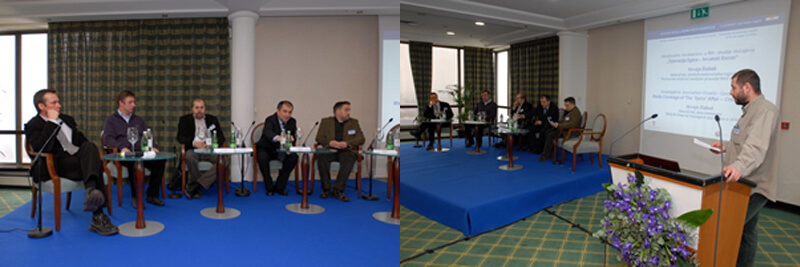
Večernji list journalistHrvoje Šlabek, who won the international award ‘Journalist courage’ for writing about the Podravka affair, gave a presentation entitled ‘Operation Spice – the Croatian Enron’. In his opinion, the ‘Spice’ affair is a good example of demystifying the motives that initiated an investigation into one of the biggest corruption-related cases in the post-Sanader Croatia. It did not come as a result of ‘the political will to fight corruption’, or the fact that USKOK had been given by the amended Criminal Code new, stronger tools for criminal prosecution. According to available information, the investigation was initiated after a tip-off from the Ministry of Finance on suspect relations between the Koprivnica-based food producer and the Split-based SMS company.
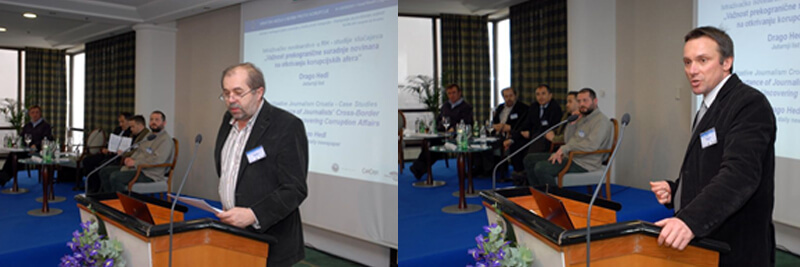
Jutarnji list journalist Drago Hedl gave a presentation entitled ‘The importance of journalist cross-border cooperation in uncovering corruption affairs. He started with the claim that mafia organizations in countries in the region have excellent cooperation. Also, police in these countries have recently begun to cooperate in fighting crime. At the same time, however, journalists from countries in the region hardly ever join their forces in working on corruption-related investigative stories, and even then, it is on a case-to-case basis. Hedl wondered why cooperation between journalists from different countries is so poor. The possible causes, in his opinion, include fighting for exclusivity, the costs that such investigation entails, as well as hesitation by journalists themselves to work on cross-border projects. Despite this, it is clear that journalists, when the topic they are dealing with requires so, can work better and more successfully in mixed teams than in isolation. Articles from colleagues in the region are used, often without citing the source, instead of cooperating by working on the same topic. Using the positive example of writing about the theft that involved both Croatian Railways and Serbian Railways, Hedl ended his presentation with the conclusion that better cross-border cooperation among journalists would certainly result in a higher number of uncovered corruption affairs.
Novi list journalist Boris Pavelić gave a presentation entitled ‘How big companies manipulate the media’. It is obvious, he pointed out, that the conflict between the advertisers and the publisher’s freedom of speech results in the latter being on the receiving end. Pavelić analysed a recent example of open blackmailing of a publisher by a big advertiser, who made it clear that their marketing cooperation would come to an end should the publisher continue writing the way the advertiser did not like. Pavelić concluded by saying that pressure from advertisers presents a big obstacle to objective reporting and uncovering corrupt conduct.
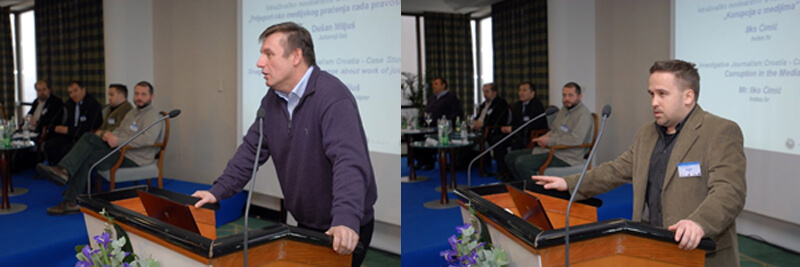
Jutarnji list journalist Dušan Miljuš said that the problems related to covering actions by judicial bodies cannot be solved by limiting media access to information. As for all the talk during the first two days of the conference about leaking information, Miljuš said that would always be the case, and that it is the institutions owning that information that bear prime responsibility for keeping them. In investigative proceedings there are situations in which the interest of the public justifies publicizing such information. At the same time, journalists must be aware that there are situations when publicizing such information may endanger not only the investigation, but human lives as well! And that is the line that should never be crossed. However, both the media and the judiciary must show understanding for the rules of the profession and respect each other. Prejudices should be avoided in this: both those in the judiciary about the media, and those in the media about the judiciary.
Index.hr portal journalist Ilko Ćimić stressed in his presentation the existence of corruption in the media themselves, with some media owners as parts of the profit-making corruption chain. In his opinion, the fight against corruption has affected a large part of society, but has not, unfortunately, been transferred enough into the media arena, which in Ćimić’s opinion, makes the media the worst element of Sanader’s legacy. He condemned the fact that his colleagues do not publish articles about media owners, in particular about EPH co-owner Ninoslav Pavić, who had been involved in the suspect privatization of Slobodna Dalmacija, although many authentic documents about the purchase of this Split-based daily have been publicized. Furthermore, there had been no reports about Novi list owner Robert Ježić before his recent arrest. Ćimić asked why Croatian media publish nothing or very little about the Hypo Bank affair, which he called ‘mother of all affairs and the origin of corruption’. In the end, Ćimić concluded that even though the ringleader was down, the media system remained the same, waiting for a new boss, another Sanader. Since numerous and quite different opinions had been heard during the two days of the conference, it was decided that no binding conclusions would be adopted.
Yet, in most presentations there were several recommendations to Croatian journalists, editors, publishers and media owners, as well as public officials:
- Croatian media are a significant and indispensable factor in continuous and unrelenting comprehensive social efforts in fighting corruption;
- HND should set up a Media Council that would assume a coordinating role in media coverage and direction of anti-corruption efforts; once a year, the Media Council should issue a report on the fight against corruption in the media, with an overview and ranking of the biggest corruption affairs, an assessment of their media coverage and an assessment of the contribution of particular journalists in the fight against corruption;
- HND and the Association of Publishers should define guidelines and standards for covering corruption affairs;
- special annual anti-corruption media and journalist award should be established;
- HND and media publishers should, in cooperation with judicial bodies, define a policy of equal access to information about corruption;
- HND and media publishers should cooperate on finding ways and methodologies for strengthening editorial policies in terms of their becoming independent from the business interests of their publishers.
Source: Official Press release of the Project ‘Strengthening Anti-Corruption Inter-Agency Cooperation – Awareness Raising Campaign’ financed through the EU IPA 2007 program for Croatia and implemented for the Croatian Ministry of Justice
The current state of investigative journalism in Croatia
Zagreb, January 2011
Source: Analysis of the current state of investigative journalism in Croatia was developed as a part of the project ‘Strengthening Anti-corruption Inter-agency Cooperation – Awareness Raising Campaign, led by Key experts Constantin Palicarsky and Ksenija Renko.


